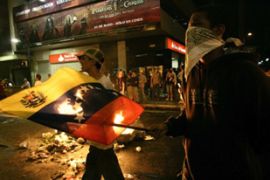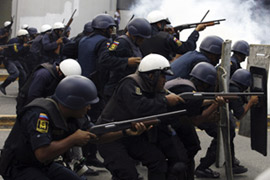Venezuela targets another station
Globovision accused of “inciting Chavez’s murder” and CNN of trying to discredit him.

Published On 29 May 2007
CNN issued a statement late on Monday, saying “we strongly deny” being “engaged in a campaign to discredit or attack Venezuela”.
The move against RCTV, which has since been replaced by a state-run channel to promote socialist programmes, sparked condemnation from at home and abroad, and accusations that Chavez was undermining democracy.
Incitement
Lara said experts hired by the ministry found Globovision had showed footage of an attempt on the late Pope John Paul II’s life in 1981 accompanied by the song This Does Not Stop Here, sung by Ruben Blades, now Panama’s tourism minister.
| Your Views |
|
“I believe that the closing-down of the television station is very justified” Medishagh, Nouakshott, Mauritania |
“The conclusion of the specialists … is that they are inciting the assassination of the president of Venezuela,” Lara told the state prosecutor.
The interpretation of the clip leads to inciting the president’s assassination, he said.
Lara said: “In Venezuela there is a context” for this kind of thing “due to the fact that the president has in several occasions denounced existing plans to assassinate him, and that there are groups whose political plans include an assassination against his person.”
Alberto Federico Ravell, Globovision director, denied any wrongdoing, calling the allegations “ridiculous”.
Chavez accuses both Globovision and RCTV of backing a bungled 2002 coup against him.
A Globovision reporter at the prosecutor’s office said the footage was taken out of context.
The channel had been airing archive footage from RCTV accompanied by songs with a farewell theme the week before RCTV’s closure, the reporter said.
CNN admission
With regard to CNN, Lara said the channel aired a story about the Venezuelan protests, but used images taken in Mexico of an unrelated story.
“CNN broadcast a lie which linked President Chavez to violence and murder,” he said.
 |
| Protesters threw stones and bottles at police who fired tear gas and rubber bullets [Reuters] |
CNN acknowledged a video mix-up, and “aired a detailed correction and expressed regret for the involuntary error”.
Regarding al-Qaeda’s leader, CNN said that “unrelated news stories can be juxtaposed in a given programme segment just as a newspaper page or a news website may have unconnected stories adjacent to each other”.
In Caracas, Benoit Hervieu, Americas director at Reporters Without Borders, said: “Yesterday we saw the takeover of the principal media critical of President Chavez.
“Besides Globovision, what television media is left that can criticise the government of Mr Chavez?”
Protests
Dima Khatib, Al Jazeera’s correspondent in Latin America, said about 1,000 people, mostly students from different universities in Caracas, rallied in a busy area of the capital to protest against the government’s decision not to renew the free-to-air broadcast licence of RCTV.
The demonstrations were at first peaceful but police fired tear gas and rubber bullets when a group tried moving towards a main avenue in the area, she reported.
Protesters threw stones and bottles at the police.
Smaller protests took place in other Venezuelan cities, but died down later.
Pedro Carreno, the interior minister, said that the protests were “part of an opposition plan” to use the RCTV case to “attack peace and security of citizens and of the state”.
Source: Al Jazeera, News Agencies